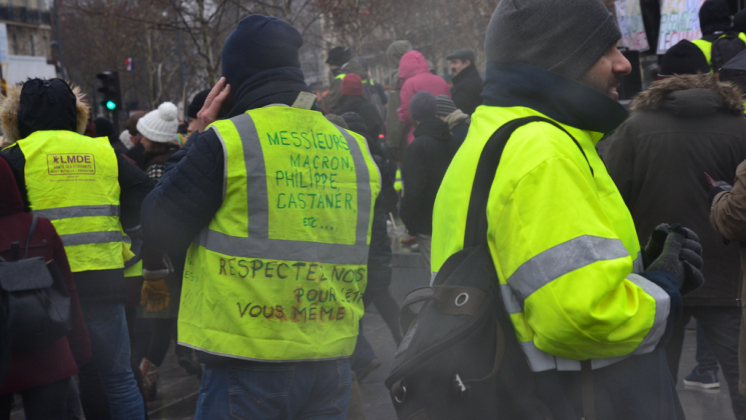Alain de Benoist: Why the government doesn't understand the Yellow Vests' revolt …
Do you think that we can already make a review of the Yellow Vests' action?
The best review that we can make about it is to note that it's still too early to make one, because the movement is ongoing and even seems to have found a second wind. For almost three months, despite the ice and the cold, despite the Christmas truce, despite the dead and wounded, despite the causalities caused by police brutality (torn off jaws, shredded hands, crushed feet, punctured eyes, cerebral hemorrhages), despite the criticisms that have successively tried to present them as alcoholic beaufs1, Nazis (the “brown plague”) and thugs, guilty moreover of having ruined commerce, of dissuading tourists from coming to France, and even, oh the scandal, of having sabotaged the opening of sales, despite all that, the Yellow Vests are still here. They've held up well, they haven't disbanded and a majority of French people continue to approve their action. This is the confirmation that this movement is unlike any other.
There is another point on which we must insist. The Yellow Vests, previously, didn't know each other. Plunged into the anonymity of the mass, even when they were neighbors, they often remained strangers to each other. For weeks, around the roundabouts, they mutually discovered each other. They spoke together, they confronted their experiences and their hopes, shared the same anger and resonated with the same emotions, they also shared the same meals, experienced the same days and even nights, benefited from the same spirit of solidarity and giving. The Yellow Vests movement has thus functioned as a formidable machine to recreate socialization in an era where the social link has crumbled everywhere. There will evidently remain something of it. The Yellow Vests know, henceforth, that they are no longer alone to be “invisibles.” They've rediscovered the importance of the commons.
But the future of the movement? Can we imagine a vast populist front, of which the Yellow Vests could be the crucible?
It's very premature, even if certain people think so. In the short term, the Yellow Vests must resist all attempts at division and recapture. They must especially not present electoral rolls to the European elections, which would certainly weaken the opposition. The must remain elusive, bring the least possible harm to small businesses, firmly remove external thugs from the movement, and, maybe, concentrate their demands on themes that can best unite their anger by demanding, for example, the institution of the popular referendum initiative.
And the “great national debate?”
Guy Debord said that if elections could change anything, they would have been banned long ago. We can say the same about the “great debate” launched by Emmanuel Macron: if it was really likely to satisfy the Yellow Vests' demands, it simply wouldn't have taken place. When parliamentarians want to bury an issue, they create a commission. To buy time, Macron proposes – it's fashionable – to “open the floor”. The “great debate” is doctor Freud's couch: “Lie down and tell me all your miseries, afterwards you'll feel better.” To discuss rather than decide has always been the favorite method of the bourgeois class. In the worst case, the “great debate” will terminate without results. At best, the mountain will give birth to a mouse2. They will make concessions here and there (the carbon tax, the 80 km/h speed limit, etc.) but they won't touch the hard questions. That is to say the questions that imply a real change in society.
Those who are in power today are incapable of facing the Yellow Vests' demands because the lower world is mentally, culturally, and physiologically foreign to them. They imagine that they are facing demands of the classic type (“discontent people”) to which they can respond through mere announcements and appropriate communication strategies. They don't see that they are, in reality, confronted with a necessarily existential revolt, coming from people who, after having wasted their lives trying to earn, have discovered that what they earn no longer permits them to live and so they no longer have anything to lose. At the height of the demonstrations, at the moment where a helicopter circled Élysée in case Macron needed to be extracted, they were nevertheless afraid. Physically afraid – and we haven't seen that in a long time as well. Today, they've recovered their class contempt, even when they try to be empathetic, they will never forgive those who frightened them.
The “reluctant Gauls” are worthy successors of the “Beggars” (Geuzen) who, in 16thcentury Flanders and the Netherlands made a title of glory from a pejorative name, carrying the popular discontent that received the support of William of Orange against the authority of King Phillip II of Spain. The guerrilla war they lead over the years starting from 1556 ended up achieving the total liberation of the United Provinces. A beautiful Dutch song celebrating their memory was entitled “Long Live the Beggars!” It deserves to be sung again today.
Notes:
1) Beauf is a French colloquialism for a chauvinistic, unrefined, and unintelligent man with strong uninformed opinions, popularized by the Charlie Hebdo cartoonist Cabu, who created a character of that name, derived from a contraction of the French for brother in law, “beau-frère”. The term can be likened to “Redneck” in American English.
2) In French “La montagne accouchera d’une souris” means that a marginal result will be obtained from a large amount of effort.
Interviewer: Nicolas Gauthier






